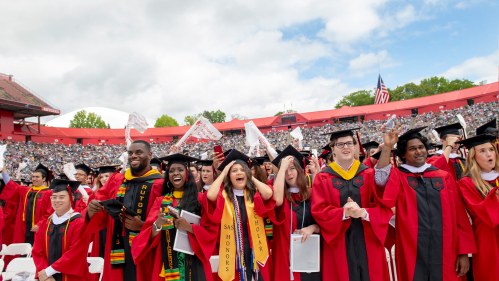
Celebrating the Success of Our First-Generation Students

This week marks a nationwide celebration of students who are the first in their families to attend college. The celebration highlights the unique challenges first-generation students face while also shining a spotlight on their accomplishments.
Across Rutgers, about 18,000 undergraduates – 37 percent of the entire student body – are first-generation, according to the most recent statistics available. In honor of this year's celebration, we asked some of our first-generation students to share their stories about their journey and their successes.
Here is what they had to say.
By the Numbers
Rutgers-New Brunswick
Rutgers-Newark
Rutgers-Camden
Rutgers Biomedical and Health Sciences
He Refuses to Let Financial Hardships Limit Opportunities
Travis Anane
School of Environmental and Biological Sciences
Rutgers University-New Brunswick
Travis Anane found success as a first-generation student by asserting himself and asking questions.
“If you don’t ask, there are opportunities you are going to miss,” said Anane, 20, a junior majoring in kinesiology and exercise science in the School of Environmental and Biological Sciences (SEBS). “If I didn’t ask questions when I got to Rutgers, there is a lot I would not have been able to do.”
Like being able to spend two weeks abroad last summer studying diversity, equity and inclusion at The Hague University of Applied Sciences in the Netherlands. Studying diversity, Anane was one of 18 low-income students nationwide nominated to be part of the Keith Sherin Global Leaders Program that paid for the opportunity. Without it, Anane says, he would never have had this once-in-a-lifetime opportunity.
“If I didn’t ask how I could be part of this trip abroad it would never have happened,” said Anane, a THRIVE Scholar, part of a federally funded program that offers financial and academic support to low-income students. Now as a mentor in the program, Anane will be going to Washington, D.C. over the next few months to ask Congress for more financial support for the TRIO programs that provide services for students from disadvantaged backgrounds.
His list of accomplishments and service is long. The South Jersey native has volunteered at his local hospital, organizing blood drives and scheduling athletic events for charity. Anane also is the community chair of the Rutgers Minority Association of Pre-Health Students and a SEBS honors student.
In addition to volunteering, Anane works in the exercise lab at Rutgers and is a resident assistant on the Livingston campus. He strives to serve as a role model for African American and minority students from adverse and impoverished backgrounds.
What tops his list of achievements so far is the more than $1 million he helped to raise for America Needs You, a nonprofit organization dedicated to serving and supporting first-generation, low-income students. Anane shared his story recently at a fundraising event in New York. He was asked to introduce Rutgers President Jonathan Holloway who was there as a guest speaker.
“It was an honor because this program has helped me so much,” said Anane. He also credits his mother, who works long hours as a nursing assistant, and his grandfather, for pushing him to succeed. “I grew up not having everything I wanted so I needed to find a different way,” he said.
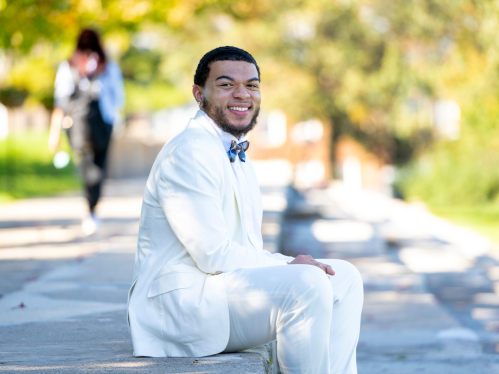
First-Generation American Driven to Give Back to Her Community
Larissa De Paula
New Brunswick Honors College
School of Arts and Sciences
Rutgers-New Brunswick
Some students need time to settle into college before deciding on a major and career path.
Not Larissa De Paula.
“I’ve had my answer since I was 9. I want to be an immigration lawyer,” said the Rutgers-New Brunswick Honors College sophomore who is working toward a dual major in criminal justice and political science with a minor in Latina and Caribbean studies in the School of Arts and Sciences.
A first-generation American and the first in her family to attend college, De Paula’s hyper-focus stems from a sense of obligation to give back to her family and the Brazilian community that raised her outside of Boston. Growing up, she heard harrowing stories from friends who nearly lost their lives on their way to seek asylum in the United States.
“I was born here, so I have the opportunity to help people who were not,” said the 19-year-old who is also fluent in Portuguese and speaks some Spanish. “What really motivated me to go into immigration law was the anti-immigration propaganda online after President Trump was elected in 2016. People have this disconnect, but people don’t just leave their homes for no reason.”
De Paula said her mother, who emigrated from Brazil at 20, dreamed of becoming a reporter, but her family could not afford to send her to college. Instead, the single mother supported her two daughters working as a house cleaner and stressed the importance of higher education as early as elementary school.
“My mom was really supportive of me going to college,” she said. “She wasn’t able to help me as much as she wanted, but she was always cheering me on. She’s really proud of me getting here.”
De Paula said a language barrier and lack of experience prevented her mom from being able to assist her with the complex process of applying to college and for financial aid. Instead, De Paula turned to her high school guidance counselors and mentors at Rutgers through Thrive Student Support Services, a program for first-generation students, for support.
But it’s the grit her mom instilled in her to keep pushing ahead that De Paula relies on every day at as a first-generation Rutgers student, she said.
“I’m not inherently smart. I just work really hard,” said De Paula, who is among the first Posse Scholar cohort at Rutgers – a program for students who demonstrate extraordinary leadership skills – and the recipient of a full merit scholarship. “Something I learned over the years is say, ‘Yes,’ even if you’re scared. I have a more determined mindset because I don’t have much on the line to lose. It keeps me motivated.”
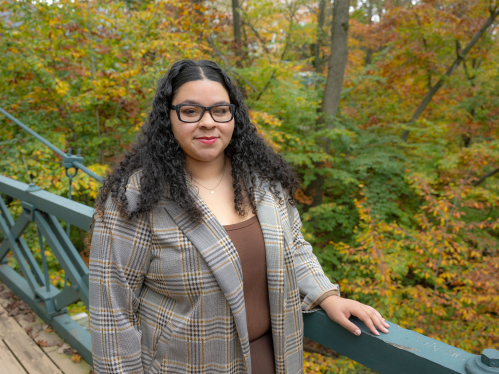
Long-Time Newark Public Servant Fulfills College Dream
Safanya Nicole Searcy
Honors Living Learning Community
Rutgers-Newark
Safanya Nicole Searcy is carrying 15 credits this semester, sharing a suite with 20-somethings in Rutgers-Newark’s Honors Living Learning Community (HLLC) and is a student representative to the Board of Governors.
But unlike most sophomores, Searcy, 42, arrived on campus with two decades of experience as a public servant and political organizer and is still holding down her full-time job as a national deputy director at the Service Employees International Union.
Born and raised in Newark, Searcy is the first in her family to attend college – an opportunity she would have jumped at 20 years ago – had it been financially feasible.
“I was raised by my grandmother who worked as a nursing assistant and raised myself and my younger brother on $30,000 a year,” she said. “I was not aware of the programs I could have applied to for assistance.”
In 2020, she decided to take advantage of the tuition remission her union membership affords and enrolled in Eastern Gateway Community College.
“God had already proven to me I didn’t need the credentials to succeed, but the desire to get the credentials never left me,” she said. “I started slow crawling it with one class here, two classes there.”
That was until Searcy attended a community meeting on reparations in 2021. There she spoke at length about the systemic inequities that need to be addressed before the benefits of reparations could be felt fully by the Black community. Her presentation impressed HLLC Dean Timothy Eatman, who was leading the meeting.
“He said, ‘Where did you complete your scholarship?,’ and I said, ‘I didn’t.’ He said, ‘What?!’ And then told me he thought my journey is an example of what it means to be an HLLC scholar,” she said of that life-changing conversation. “Dean Eatman encouraged me to apply as a transfer. That’s what I did, and the rest is history.”
Now a double major in justice studies and political science with a minor in social justice, Searcy is on track to graduate by 2026, but said she may not stop there. She is considering a run at law school or working toward her doctoral degree, which would enhance her advocacy work. But for now, she said she is thoroughly enjoying living and learning with her HLLC scholars.
“I light up when I’m around them. These young adults are brilliant. As an adult you learn to lead from behind. I want them to build leadership skills, and I want to be there to support all that,” she said. “But when I lift my voice on certain subjects, such as Newark history, the tremendous amount of respect they show me is incredible. I’m so excited to be on this learning journey with them.”
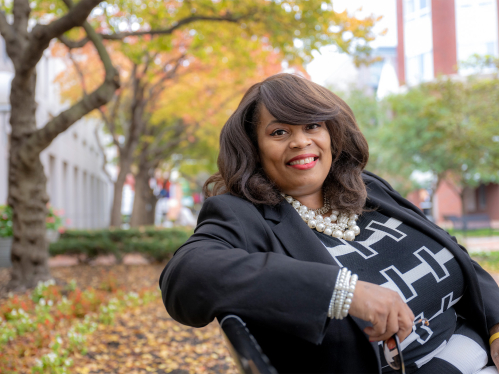
Drawing on the Lessons of a First-Generation Student
Wandys Aquino
Rutgers University-Camden
For all the knowledge sophomore computer science major and Honors College student Wandys Aquino has acquired so far at Rutgers-Camden, there is one personal lesson that has stayed with him.
“I’ve learned what it means for us, for our families, and for the college to be a first-generation student,” said Aquino, 19. “We're starting a lineage of being successful in college, and everything falls on us because we have nothing behind us. We're starting the building from the foundation. Being a first-generation student, I thought this message was just incredible. It was something I will never forget.”
Just a few short years ago, Aquino moved with his family to the United States from their native Dominican Republic. He enrolled in high school during the lockdown phase of the Covid-19 pandemic, acclimating to a junior year of online learning that presented barriers of both language and culture. Despite those obstacles, Aquino made continued progress, and a history teacher encouraged him to apply to Rutgers.
Aquino credits the Rutgers-Camden Student Support Services program with shaping his college experience by teaching him what being a first-generation student means and connecting him to resources he said some students might not even know exist on campus: one-on-one counseling, peer tutoring, and mental and financial health support. These lessons began at the Equal Opportunity Fund (EOF) Summer Institute, a bridge program that helps students with the transition to college, and continued with TRiO, a federally funded program on the Camden campus that supports first-generation and limited-income families as well as students with disabilities.
Aquino is also part of the Bridging First-Generation Students (B1GS) organization, which he invites other first-generation students to join on campus.
“We know that it's hard for first-generation students to have somebody to support them and to get resources, because they may not have a voice in their family to tell them, ‘Oh, well, this is how you do things in college.’ Because they are the first in the family, they have to experience that by themselves,” Aquino said. “We know that sometimes they might be afraid of doing that, so we try to encourage them.”
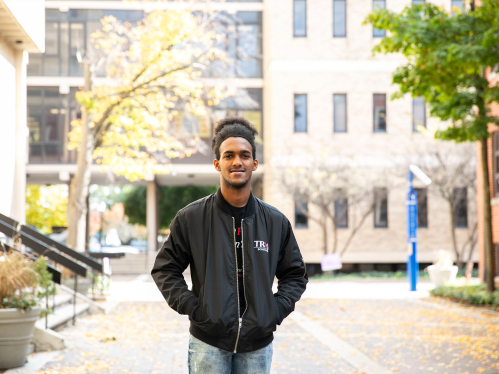




First-Generation
Rutgers-New Brunswick
Rutgers-Newark
Rutgers-Camden
Rutgers Biomedical and Health Sciences
By Lisa Intrabartola, Robin Lally and Christina Lynn
Photos by Nick Romanenko and Ron Downes Jr.
Produced by Andrea Alexander
Published Nov. 7, 2023